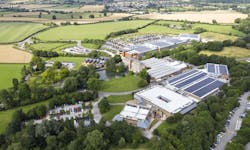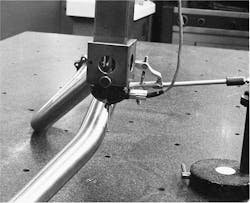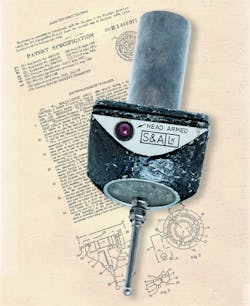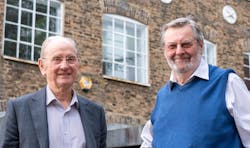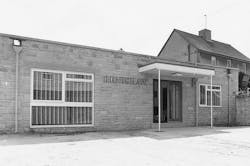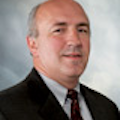Renishaw is celebrating 50 years of engineering innovation with a year of global activities including open-house events at its largest sites, family days for employees and a “50 at 50” charity initiative, which will see almost $190,000 donated to 50 not-for-profit organizations in the 36 countries where it has offices.
“I've used Renishaw spindle and tool probes for more than 15 years across many platforms—milling and turning, on almost every machine control—and the consistency of programming across those platforms makes probing a breeze,” said Samuel Patterson, CNC applications engineer at Knox Machinery in Franklin, Ohio. “Combine that with top-notch tech support and the best programming manual I've ever seen.”
McMurtry and Deer quickly saw the potential for the use of probes on computer numerical control (CNC) machine tools and in 1977 Renishaw launched its first commercial probe for machine tools (Figure 4).
“We at Mazak would like to extend a hearty congratulations to Renishaw on its 50th Anniversary,” said Dan Janka, president of Mazak. “Mazak has had a longstanding relationship with Renishaw, which is a leader in its industry, and we often rely on their metrology in the testing and demonstration of our manufacturing technologies such as with the Mazak Smooth Set & Inspect function that uses Renishaw probes and helps speed job setups for our customers.”
A significant amount of Renishaw’s business is still derived from contact and non-contact laser measurement systems for CMMs and machine tools, the company now supplies a wide range of metrology systems for calibration, position feedback and gauging, plus associated accessories including styli and fixturing. It has also applied its core expertise in measurement, manufacturing and process control to develop systems for non-destructive testing using Raman spectroscopy, robots and drug delivery systems for brain surgery, and is also a technology leader in the field of metal additive manufacturing—3D printing.
"Renishaw has four main product groups—precision measurement and process control; position and motion control; healthcare; and additive manufacturing," explained Jim Ready, regional sales manager at Renishaw. "I look after the precision measurement and process control products for a seven-state territory in the upper Midwest. Our products help manufacturers maximize production output, reduce the time it takes to produce and inspect components and keep their machines running reliably."
"Our Hurco customers use a variety Renishaw part and tool probes for their individual applications," explained Mike Cope, product technical specialist at Hurco. "Renishaw products are both reliable and accurate, and they provide our customers with the confidence they need to be successful."
“This is a year to reflect on the tremendous achievements of our co-founders and employees past and present, who have done so much to advance precision manufacturing globally and to look forward with confidence to future decades of innovation and growth,” said Will Lee, chief executive at Renishaw.
“The formula that has ensured Renishaw’s success over the past 50 years remains at the heart of our approach to business—investing heavily in research and development to ensure a continuing stream of world-leading products; a commitment to high-quality in-house manufacturing that ensures we can meet the exacting requirements of our global customers; and a focus on excellent local customer service and support through our wholly owned subsidiary operations,” continued Lee.
“On behalf of Renishaw, I would also like to thank our customers and suppliers, many of whom we have had close relationships with for most of our history and with whom we have shared mutual success, and our other stakeholders, including our local communities who have been highly supportive of our growth and have also shared in our success,” concluded Lee.
Renishaw’s largest manufacturing sites are located in the United Kingdom, Ireland and India. About 95% of Renishaw’s $840 million in sales was due to exports, largely in China, the United States, Japan and Germany.
"From an OEM standpoint, and I am sure an end-user standpoint, as well, Renishaw’s support when we have questions has always been very easy to come by and quick with answers," said Jason Falk, applications manager, CMTSE, at Hurco. "It is nice when dealing with such technical products to have support when you need it to keep production moving."
About the Author
Mike Bacidore
Editor in Chief
Mike Bacidore is chief editor of Control Design and has been an integral part of the Endeavor Business Media editorial team since 2007. Previously, he was editorial director at Hughes Communications and a portfolio manager of the human resources and labor law areas at Wolters Kluwer. Bacidore holds a BA from the University of Illinois and an MBA from Lake Forest Graduate School of Management. He is an award-winning columnist, earning multiple regional and national awards from the American Society of Business Publication Editors. He may be reached at [email protected]

Leaders relevant to this article:
